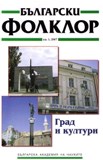Паркът – наследство и диалози
The Central Urban Park – Dialogues and Patrimony
Author(s): Meglena ZlatkovaSubject(s): Anthropology
Published by: Институт за етнология и фолклористика с Етнографски музей при БАН
Summary/Abstract: The city as patrimony and dialogue between cultures, used in current paper, is approached through an urban place – Central park. That place was chosen as a public space, accessible by everyone – locals and foreigners, associated with the free time and entertainments that provides possibilities for social communication, and connected with special norms of behavior and social and cultural practices. Such kind of public spaces are shared by the urban dwellers; they are results of continuous process of interaction between people and environment and productions of common senses, feelings and local knowledge. That norms and knowledge could be inherited and incorporated by the process of socialization and life in the city. The theoretical frame of the presented research is the study of the Central park in Plovdiv as a socially constructed nature in the city. As such kind of place the Park is a result of negotiations between the city dwellers and local authorities and among the urban people as well that constructs meanings, images and uses. As a public space the Park is a stake of symbolic fights and urban policies. In that sense the study of the discourses and images of the place is a study of the different urban situations in Plovdiv, forms of urban culture and visions for the city and patrimony. One of the first steps of the local governances in the new liberated Bulgarian state after 1878 is creation of public parks and gardens in the main cities. This is not just an attempt to modernize and Europeanize Ottoman cities but also it is a mark of the ongoing changes in the Bulgarian society. The current situation in Plovdiv is presented with the background of the previous capitalist and socialistic ones. For that purpose the park is presented as a result of construction from above: activities of the local authorities, civil initiatives and infrastructure changes in the part Park as a patrimony of the city. The second part – the Park as a patrimony of the city dwellers – presents the construction of the place from bellow: analysis of the uses of the park, inhabitants in the park, appropriation of the sites, and communities around significant places. The article is based on an ongoing field research, started in 2003.
Journal: Български фолклор
- Issue Year: XXXIII/2007
- Issue No: 1
- Page Range: 37-45
- Page Count: 9
- Language: Bulgarian
- Content File-PDF

